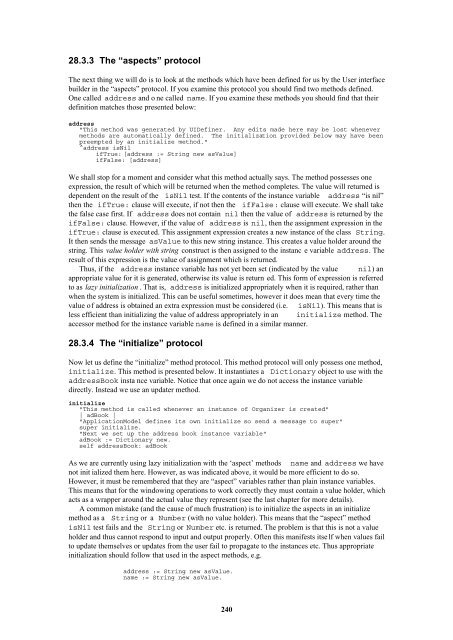Smalltalk and Object Orientation: an Introduction - Free
Smalltalk and Object Orientation: an Introduction - Free
Smalltalk and Object Orientation: an Introduction - Free
You also want an ePaper? Increase the reach of your titles
YUMPU automatically turns print PDFs into web optimized ePapers that Google loves.
28.3.3 The “aspects” protocol<br />
The next thing we will do is to look at the methods which have been defined for us by the User interface<br />
builder in the “aspects” protocol. If you examine this protocol you should find two methods defined.<br />
One called address <strong><strong>an</strong>d</strong> o ne called name. If you examine these methods you should find that their<br />
definition matches those presented below:<br />
address<br />
"This method was generated by UIDefiner. Any edits made here may be lost whenever<br />
methods are automatically defined. The initialization provided below may have been<br />
preempted by <strong>an</strong> initialize method."<br />
^address isNil<br />
ifTrue: [address := String new asValue]<br />
ifFalse: [address]<br />
We shall stop for a moment <strong><strong>an</strong>d</strong> consider what this method actually says. The method possesses one<br />
expression, the result of which will be returned when the method completes. The value will returned is<br />
dependent on the result of the isNil test. If the contents of the inst<strong>an</strong>ce variable address “is nil”<br />
then the ifTrue: clause will execute, if not then the ifFalse: clause will execute. We shall take<br />
the false case first. If address does not contain nil then the value of address is returned by the<br />
ifFalse: clause. However, if the value of address is nil, then the assignment expression in the<br />
ifTrue: clause is executed. This assignment expression creates a new inst<strong>an</strong>ce of the class String.<br />
It then sends the message asValue to this new string inst<strong>an</strong>ce. This creates a value holder around the<br />
string. This value holder with string construct is then assigned to the inst<strong>an</strong>c e variable address. The<br />
result of this expression is the value of assignment which is returned.<br />
Thus, if the address inst<strong>an</strong>ce variable has not yet been set (indicated by the value nil) <strong>an</strong><br />
appropriate value for it is generated, otherwise its value is return ed. This form of expression is referred<br />
to as lazy initialization . That is, address is initialized appropriately when it is required, rather th<strong>an</strong><br />
when the system is initialized. This c<strong>an</strong> be useful sometimes, however it does me<strong>an</strong> that every time the<br />
value of address is obtained <strong>an</strong> extra expression must be considered (i.e. isNil). This me<strong>an</strong>s that is<br />
less efficient th<strong>an</strong> initializing the value of address appropriately in <strong>an</strong> initialize method. The<br />
accessor method for the inst<strong>an</strong>ce variable name is defined in a similar m<strong>an</strong>ner.<br />
28.3.4 The “initialize” protocol<br />
Now let us define the “initialize” method protocol. This method protocol will only possess one method,<br />
initialize. This method is presented below. It inst<strong>an</strong>tiates a Dictionary object to use with the<br />
addressBook insta nce variable. Notice that once again we do not access the inst<strong>an</strong>ce variable<br />
directly. Instead we use <strong>an</strong> updater method.<br />
initialize<br />
"This method is called whenever <strong>an</strong> inst<strong>an</strong>ce of Org<strong>an</strong>izer is created"<br />
| adBook |<br />
"ApplicationModel defines its own initialize so send a message to super"<br />
super initialize.<br />
"Next we set up the address book inst<strong>an</strong>ce variable"<br />
adBook := Dictionary new.<br />
self addressBook: adBook<br />
As we are currently using lazy initialization with the ‘aspect’ methods name <strong><strong>an</strong>d</strong> address we have<br />
not init ialized them here. However, as was indicated above, it would be more efficient to do so.<br />
However, it must be remembered that they are “aspect” variables rather th<strong>an</strong> plain inst<strong>an</strong>ce variables.<br />
This me<strong>an</strong>s that for the windowing operations to work correctly they must contain a value holder, which<br />
acts as a wrapper around the actual value they represent (see the last chapter for more details).<br />
A common mistake (<strong><strong>an</strong>d</strong> the cause of much frustration) is to initialize the aspects in <strong>an</strong> initialize<br />
method as a String or a Number (with no value holder). This me<strong>an</strong>s that the “aspect” method<br />
isNil test fails <strong><strong>an</strong>d</strong> the String or Number etc. is returned. The problem is that this is not a value<br />
holder <strong><strong>an</strong>d</strong> thus c<strong>an</strong>not respond to input <strong><strong>an</strong>d</strong> output properly. Often this m<strong>an</strong>ifests itse lf when values fail<br />
to update themselves or updates from the user fail to propagate to the inst<strong>an</strong>ces etc. Thus appropriate<br />
initialization should follow that used in the aspect methods, e.g.<br />
address := String new asValue.<br />
name := String new asValue.<br />
240
















